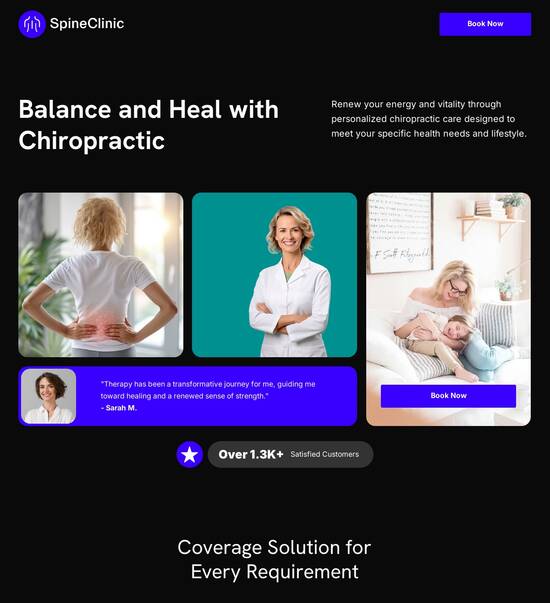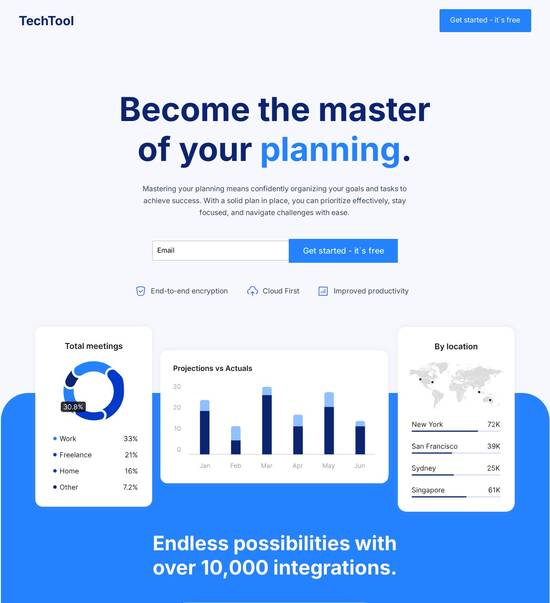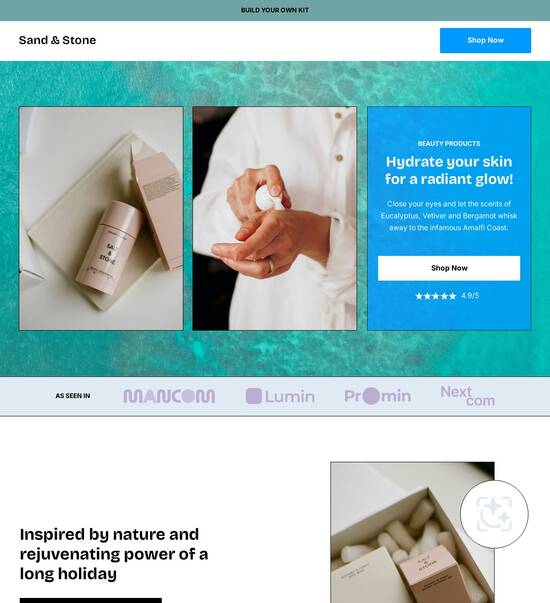
CRM website template compatible with Shopify
Explore Similar TemplatesAbout template
Streamline your content management with CRM website templates designed for compatibility with Shopify.
Recommended templates

Easy to build without coding
With the intuitive drag-and-drop builder, anyone on your team can create high-converting pages without any knowledge of code or design. Make enhancements to your landing page with custom widgets using Javascript, HTML/CSS, or third-party scripts.

Multiple layouts for any industry and goal
Select from 500+ landing page layouts built to boost conversions across industry-specific scenarios. Customize them by adjusting fonts, adding images, and generating on-brand content with the AI assistant. Quickly scale with Instablocks® and Global Blocks that you can save, reuse, and update globally.

Loads fast and looks polished on any device
Every template is responsive, which means they present professionally on any device and load blazingly fast with our Thor Render Engine. You can also power them up with Google AMP technology to deliver an unparalleled mobile experience and drive higher conversions.

Robust analytics & experimentation
Get real-time updates and reporting across all your devices, showing the number of visitors, conversions, cost-per-visitor, and cost-per-lead. Launch AI-powered experiments, run A/B tests, and use heatmaps to analyze user behavior, then optimize your landing page to maximize conversions.







Easy to build without coding
With the intuitive drag-and-drop builder, anyone on your team can create high-converting pages without any knowledge of code or design. Make enhancements to your landing page with custom widgets using Javascript, HTML/CSS, or third-party scripts.
Multiple layouts for any industry and goal
Select from 500+ landing page layouts built to boost conversions across industry-specific scenarios. Customize them by adjusting fonts, adding images, and generating on-brand content with the AI assistant. Quickly scale with Instablocks® and Global Blocks that you can save, reuse, and update globally.
Loads fast and looks polished on any device
Every template is responsive, which means they present professionally on any device and load blazingly fast with our Thor Render Engine.
Robust analytics & experimentation
Get real-time updates and reporting across all your devices, showing the number of visitors, conversions, cost-per-visitor, and cost-per-lead. Launch AI-powered experiments, run A/B tests, and use heatmaps to analyze user behavior, then optimize your landing page to maximize conversions.
All the features you need to build crm web template
Explore more featuresLearn how to build integrate crm tools with shopify landing pages
Frequently asked questions about free crm website templates
Leading the way in building high-performing landing pages





How can i integrate crm tools with shopify landing pages: Your ultimate how-to guide
Using Instapage, marketers can boost their digital marketing campaigns by leveraging powerful landing pages specifically designed for high conversion. This guide will walk you through the process of creating optimized landing pages and implementing conversion rate optimization strategies tailored to your target audience in the USA.
Understanding landing pages and CRO
Landing pages serve a crucial role in digital marketing by focusing on a specific product or service to drive conversions. Effective conversion rate optimization (CRO) helps businesses make the most of their traffic, turning visitors into leads or customers. Instapage's platform allows you to create customized, high-converting landing pages without needing coding skills.
- High-converting templates: Instapage offers 100+ ready-made templates tailored to various industries, allowing for quick deployment.
- Built-in A/B testing: Learn which elements convert best through experimentation directed by Instapage’s heatmaps and analytics.
- Personalized content delivery: Use dynamic text replacement and audience segmentation to deliver tailored messages.
Step 1: Building your landing page
To create your landing page, start by selecting a template that aligns with your marketing goals. Instapage's library enables quick deployment, facilitating efficient testing and optimization.
- Select a template based on your campaign goal: Choose from various industry-specific designs.
- Utilize Instablocks: These modular elements allow for easy customization and rapid assembly.
- Implement lead generation forms: Choose from pre-built elements to capture visitor information directly.
Step 2: Optimizing for conversions
Once your landing page is live, it’s time to optimize for higher reach and conversion rates. Instapage's analytics dashboard gives you insights into visitor behavior and performance metrics.
- Conduct A/B tests: Test different headlines, images, and call-to-action buttons to see what resonates.
- Analyze heatmap data: Understand visitor interaction on your page to refine layout and content.
- Utilize retargeting strategies: Capture warm leads with focused follow-up ads based on their behavior.
Step 3: Collaborating and reviewing
Collaboration is vital, especially in larger marketing teams. Instapage provides tools for easy feedback loops and editing capabilities to streamline the creation process.
- Real-time feedback: Share your designs with stakeholders for instant input.
- Collaborative edits: Ensure all team members can contribute during the revision phase.
- Secure sharing options: Easily manage who sees and interacts with your landing pages.
By following this structured guide, you can maximize your digital marketing efforts with Instapage's robust tools and features.
Ready to elevate your marketing strategy? Start building your landing pages today with Instapage and witness the transformation in your campaign performance.
People also ask about crm website templates
Understanding CRM Website Templates Compatible with Shopify
Defining CRM website templates
CRM (Customer Relationship Management) website templates are specifically designed frameworks that facilitate the management of customer interactions and data throughout the customer lifecycle. These templates help businesses to organize customer information, track leads, and improve customer service, ultimately enhancing the overall e-commerce experience. For online retailers using Shopify, choosing a compatible CRM template is crucial as it directly influences operational efficiencies and customer relationship management capabilities.
Key characteristics of CRM website templates include pre-designed layouts tailored for e-commerce functionalities, built-in forms for collecting customer data, and integrated analytics tools for measuring performance. These templates provide essential features to track customer behavior, sales processes, and marketing efforts, ensuring that businesses can cater to their customers effectively. When a CRM template is compatible with Shopify, it can harness the platform's extensive features enabling seamless management of online stores.
The importance of compatibility with Shopify
Integrating CRM website templates with Shopify offers numerous benefits for e-commerce businesses. Shopify is one of the leading e-commerce platforms known for its versatility and user-friendly interface. Compatibility with Shopify not only streamlines processes but also enhances data management critical to business growth. With the extensive capabilities offered by Shopify—such as payment processing, inventory management, and customer engagement tools—CRM templates can further empower retailers in managing customer relations and sales effectively.
Moreover, using Shopify's ecosystem allows businesses to access a wealth of third-party applications and plugins. This access enables effective synchronization between the CRM system and other vital tools, ensuring that customer databases, email marketing platforms, and sales software work together seamlessly. As a result, businesses can create an efficient workflow that minimizes errors, boosts productivity, and ultimately improves the customer shopping experience.
Key features of CRM website templates
User-friendly design and customizability are crucial features of CRM website templates. An aesthetically pleasing design that aligns with a brand’s identity not only attracts customers but also enhances their overall experience on the site. Customization options allow businesses to modify templates according to their unique requirements, including layout, color schemes, and functionality. This flexibility ensures that companies can present their brand in a coherent manner while addressing specific customer needs, thereby improving user engagement.
Efficient data management is another fundamental aspect of CRM website templates. Data mapping enables the systematic organization of customer information within the Shopify ecosystem. By integrating customer data, product details, and sales orders seamlessly, companies can gain a holistic view of their operations. This capability simplifies decision-making and fosters improved customer interaction as businesses can personalize their marketing efforts based on gathered insights.
Furthermore, CRM systems manage dynamic customer records, capturing essential data such as purchase history and interaction logs. This functionality is significant as it helps businesses understand customer preferences, enhancing service delivery and loyalty. The ability to access updated customer records enables businesses to adopt proactive measures, thus ensuring that they meet or exceed expectations across all stages of the customer journey.
Core components of a CRM website template
For a CRM website template to be compatible with Shopify, several essential requirements must be met. These include adherence to Shopify’s technical standards, such as responsive design, fast loading times, and mobile optimization. Furthermore, templates should integrate effortlessly with Shopify's APIs, enabling real-time data interactions. Key attributes like customizable check-out processes and scalable features are vital to ensure that as business needs expand, the CRM template can adapt accordingly.
Integration capabilities are equally important. Many CRM templates offer integration with third-party applications like Mailchimp or HubSpot, creating a broader operational framework. For example, a successful integration case study is a retail business that used a CRM template on Shopify to connect with a popular email marketing tool. This connection allowed them to automate email campaigns based on customer behaviors, ensuring personalized content delivery that contributed to higher conversion rates.
Leveraging data for business growth
Gaining insights through data analytics is critical for driving business growth. CRM templates effectively collect a variety of data types, including customer demographics and purchasing behavior. This information equips businesses with actionable insights needed to fine-tune their product offerings and sales strategies. With the right analytical tools integrated into CRM templates, companies can conduct detailed analyses, uncover trends, and develop targeted marketing campaigns that resonate with specific customer segments.
Updating customer and product information is equally important for maintaining data accuracy. Regular updates ensure that businesses have the most current and relevant information at their fingertips. This process involves monitoring customer interactions, purchase opportunities, and product availability. By implementing systematic processes for data maintenance, organizations can ensure their CRM remains an effective resource for customer interactions, which fosters successful sales engagements.
Streamlining order management
An overview of sales orders within the CRM ecosystem underlines their significance in order management. Sales orders represent the core transactions that take place between a business and its customers, encapsulating what was sold, how much was paid, and when the delivery will occur. CRM templates assist in managing and tracking these orders efficiently by providing a streamlined interface where staff can monitor order statuses and ensure timely fulfillment. This efficient process not only improves operational productivity but also enhances customer satisfaction.
Efficient handling of customer queries related to orders is another essential feature of a CRM website template. Built-in tools within the template can facilitate customer service interactions, allowing customers to access their order histories, track deliveries, and resolve any issues. By incorporating features such as live chat options and FAQs, businesses can quickly respond to customer concerns, fostering trust and loyalty over time. Effective order management and communication can significantly impact customer retention and overall satisfaction.
Enhancing user experience through innovative features
Customizable user roles and permissions are vital for CRM templates, especially for businesses with larger teams. By defining user roles, companies can streamline access to data and functionalities, enhancing security while promoting collaboration. This approach aids in operational efficiency as team members can work together seamlessly, knowing that they have the appropriate access to the information and tools they need.
Optimizing product updates and inventory management is also crucial for businesses. Having an accurate inventory list that reflects real-time product availability is critical for minimizing stockouts or overselling. Features that enable real-time synchronization between the CRM and Shopify ensure that businesses can react swiftly to changes in demand or supply, maintaining a competitive edge in the market. Implementing effective inventory management tools also adds to the overall enhanced user experience by ensuring customers can find what they want, when they want it.
Notable examples of CRM website templates for Shopify
Several CRM website templates stand out for their unique features and benefits tailored for Shopify. Templates like 'Shopify CRM by Fluent' offer integrated email marketing solutions, while 'Shopify CRM by Omni' provides advanced analytics tools that help businesses generate data-driven insights. Each has distinct advantages tailored to fit various types of businesses, whether a small boutique or a large online retailer.
Additionally, user testimonials reveal how specific templates have improved business functions. Many users have reported increased sales performance and improved customer engagement following the integration of these CRM templates. For instance, one business saw a notable increase in customer retention rates after implementing a CRM template that actively monitored customer preferences and interactions, showcasing the impact of a well-designed template on overall business outcomes.
Future trends in CRM website templates for Shopify
The evolution of technologies in e-commerce CRM suggests exciting possibilities ahead. Trends like AI integration offer potential for enhanced customer experiences through predictive analytics and chatbots. AI-powered tools can proactively engage customers and provide personalized recommendations based on behavior patterns, driving sales and satisfaction. Businesses utilizing these emerging technologies could redefine customer relationship management, creating smarter and more effective e-commerce environments.
As consumer expectations shift, the growing importance of customer experience-focused design becomes increasingly apparent. Consumers demand seamless interactions across digital platforms, and companies must respond by ensuring their CRM templates incorporate user-centric design principles. Adapting quickly to these trends will be vital for businesses aiming to maintain competitive advantage, driving further innovation in CRM functionalities for Shopify users.
Ready to skyrocket conversions?
Supercharge your ad campaigns with high-performing landing pages
Get started














